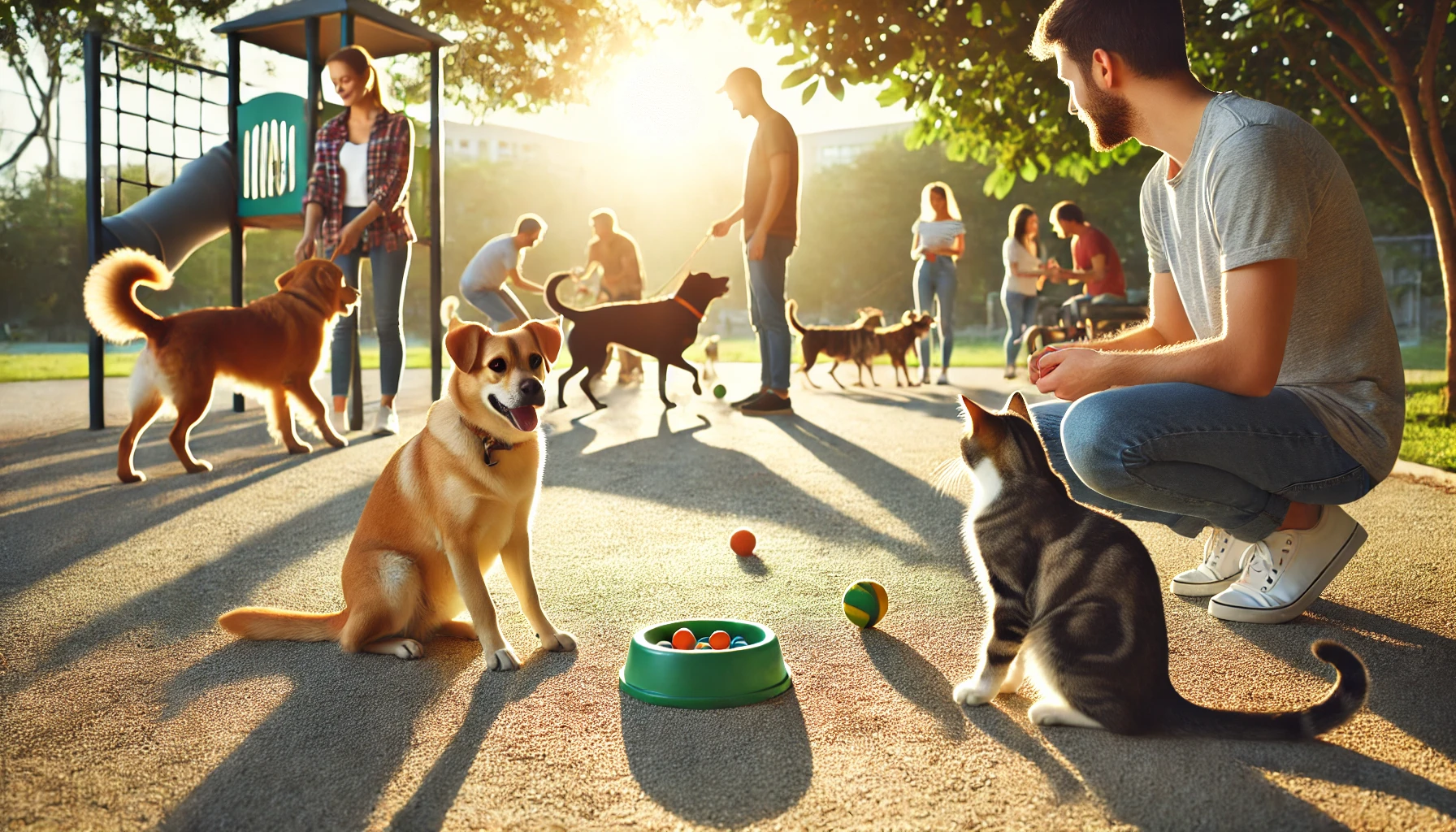Socialization is essential for your pet’s emotional health and overall well-being. A well-socialized pet is more likely to interact positively with other animals, people, and environments, reducing stress and unwanted behaviors. Whether you’re raising a new puppy or kitten or helping an older pet adapt, here’s a detailed guide to encouraging healthy socialization.
Why Socialization Is Important
Socialization helps pets develop confidence, reduce fear, and adapt to various situations.
- Improved Behavior: Socialized pets are less likely to display aggression or anxiety.
- Easier Handling: Regular exposure to new experiences makes vet visits, grooming, and travel less stressful.
- Better Quality of Life: Socialized pets enjoy interactions, leading to a more fulfilling life.
When to Start Socialization
The earlier you begin, the better the results.
- Puppies and Kittens: The critical socialization window is between 3 and 14 weeks for dogs and 2 and 7 weeks for cats. During this time, they are most receptive to new experiences.
- Adult Pets: While it may take more time and patience, adult pets can still learn to socialize effectively with the right approach.
Steps to Encourage Healthy Socialization
Start Slowly
Introduce your pet to new experiences gradually to prevent overwhelming them.
- New Environments: Begin with quiet, familiar places before moving on to busier locations like parks or cafes.
- Controlled Interactions: Arrange calm, one-on-one introductions with other pets or people.
- Short Sessions: Keep socialization activities brief to avoid fatigue or stress.
Use Positive Reinforcement
Reward your pet for calm, positive behavior during socialization.
- Treats: Offer small, high-value treats as a reward for successful interactions.
- Praise: Use a cheerful tone to encourage your pet.
- Play: Engage them in a favorite game to associate new experiences with fun.
Introduce New Experiences
Expose your pet to a variety of sights, sounds, and textures to build their confidence.
- Different Surfaces: Let them walk on grass, sand, tile, and carpet.
- Sounds: Gradually introduce noises like vacuum cleaners, doorbells, or thunderstorms at a low volume.
- Objects: Allow them to explore items like strollers, umbrellas, or bicycles.
Encourage Interaction with Other Animals
Proper interactions with other pets are crucial for building social skills.
- Playdates: Arrange meetups with well-behaved pets in neutral spaces.
- Dog Parks: Take dogs to parks where they can interact with other friendly dogs under supervision.
- Multi-Pet Households: Gradually introduce new pets to existing ones by allowing them to sniff each other through a barrier before direct contact.
Socialize with People
Introduce your pet to people of all ages, appearances, and behaviors.
- Children: Teach kids how to approach pets gently and calmly.
- Adults: Encourage interactions with friends, neighbors, or strangers in a controlled environment.
- Variety: Include people wearing hats, carrying bags, or using mobility aids to familiarize your pet with different scenarios.
Tips for Socializing Dogs
Dogs are naturally social animals but still require proper guidance.
- Leash Training: Use a leash during introductions to control interactions and prevent overstimulation.
- Obedience Commands: Teach commands like “sit” or “stay” to manage their behavior during socialization.
- Body Language: Watch for signs of stress, such as tucked tails, excessive panting, or growling. If your dog shows these signs, give them space and try again later.
Tips for Socializing Cats
Cats can be more independent and cautious, so patience is key.
- Safe Spaces: Provide hiding spots where your cat can retreat if they feel overwhelmed.
- Interactive Toys: Use wands or laser pointers to engage them during introductions.
- Calm Approach: Let cats approach people or other animals on their terms, avoiding forced interactions.
Common Challenges and How to Overcome Them
Fear or Anxiety
Some pets may react fearfully to new experiences.
- Start with low-intensity interactions and gradually increase exposure.
- Use calming aids like pheromone diffusers or anxiety wraps to ease stress.
- Consult a veterinarian or behaviorist if anxiety persists.
Aggression
Aggressive behavior can stem from fear or lack of exposure.
- Identify triggers and avoid them during early socialization.
- Use a professional trainer or behaviorist to address underlying issues.
- Never punish aggressive behavior; instead, redirect it with positive reinforcement.
Overexcitement
Energetic pets may become overly excited during socialization.
- Practice calm behavior by rewarding them when they remain relaxed.
- Take breaks to prevent overstimulation.
- Use toys or training commands to redirect excess energy.
Socialization Beyond Early Training
Socialization is a lifelong process.
- Continue exposing your pet to new experiences throughout their life to maintain their confidence.
- Refresh their training and socialization skills periodically, especially if they become more cautious with age.
- Celebrate small successes to keep the process positive and enjoyable.
The Benefits of Healthy Socialization
A well-socialized pet is a joy to be around, bringing numerous benefits:
- Better Behavior: Reduced aggression, fear, or unwanted behaviors.
- Easier Handling: Cooperation during vet visits, grooming, and travel.
- Happier Life: Increased confidence and enjoyment in interacting with the world.
Socialization is a journey that requires patience, consistency, and understanding. By creating positive experiences and tailoring the process to your pet’s unique needs, you can help them develop into confident and well-adjusted companions.

